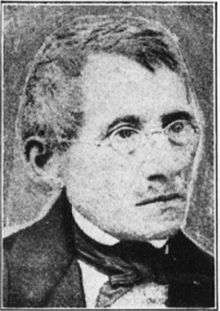Gideon Brecher
Gideon Brecher (January 12, 1797 – May 14, 1873), also known as Gedaliah ben Eliezer, was an Austrian physician and writer.

Brecher was the uncle, by marriage, to Austrian bibliographer and Orientalist Moritz Steinschneider.
Brecher was born in Prossnitz, Moravia. He was the first Jew of Prossnitz to study medicine or any other professional field. Brecher received his Master of Surgery and Obstetrics in Budapest in 1824. He received his Medical Doctor's or MD degree the University of Erlangen in 1849. His thesis was Das Transcendentale, Magie und Magische Heilarten im Talmud, (Vienna, 1850).
Brecher's fame in Jewish literature rests principally on this work and upon his lucid commentary on the "Cuzari" of Judah ha-Levi, which appeared with the text in four parts (Prague, 1838–1840). Brecher's correspondence with Samuel David Luzzato about this commentary was also published.[1]
In addition to many contributions to scientific and literary periodicals and collections, and some important "Gutachten" (expert opinions) on social and religious questions submitted to him by imperial and local government officials, Brecher is the author of a monograph on circumcision, Die Beschneidung der Israeliten, etc., (Vienna, 1845), with an introduction by R. Hirsch Fassel of Prossnitz, and an appendix on Circumcision Among the Semitic Nations, by Moritz Steinschneider. Brecher also wrote Die Unsterblichkeitslehre des Israelitischen Volkes, Vienna, 1857, of which a French translation appeared in the same year by Isidore Cahen; and Eleh ha-Ketubim be-Shemot, a concordance of Biblical proper names, part of which was revised and published after his death by his son Adolph Brecher.
Publications
- Brecher, Gideon, Das Transcendetale, Magie, und Magische Heilertarten im Talmud (Vienna Klopf und Eurich, 1850) (in German)
- Brecher, Gideon L'immortalité de l'âme chez les Juifs (A. Franck, 1857) (in German)
- Brecher, Gideon, Die Beschneidung der Israeliten, etc., (Vienna, 1845) (in German)
- Brecher, Gideon Die Unsterblichkeitslehre des Israelitischen Volkes, (Vienna, 1857) (in German)
- Brecher, Gideon Eleh ha-Ketubim be-Shemot (in German)
See also
References
- "Archived copy". Archived from the original on September 5, 2006. Retrieved March 20, 2006.CS1 maint: archived copy as title (link)
Further reading
- Ephron, John M. Medicine and the German Jews, online excerpt pp 222–233 – Ritual Circumcision in Germany
- Bibliography:M. Duschak, Gideon Brecher, eine Biographische Skizze, Prossnitz, 1865; Allg. Zeit. des Jud. xxxvii, No. 25;
- Der Orient, 1840, pp. 45et seq.;
- Brüll's Jahrb. iii. 192, 193;
- Bodek, Jeschurun, Zolkiev, 1844.S.P. Wi.
External links
![]()